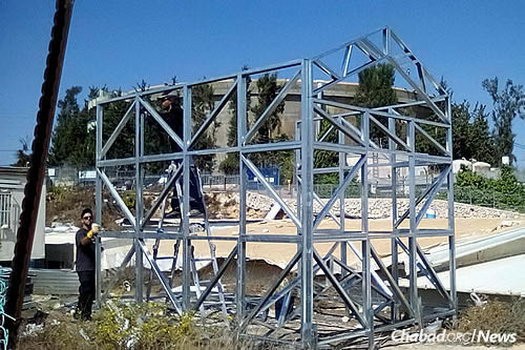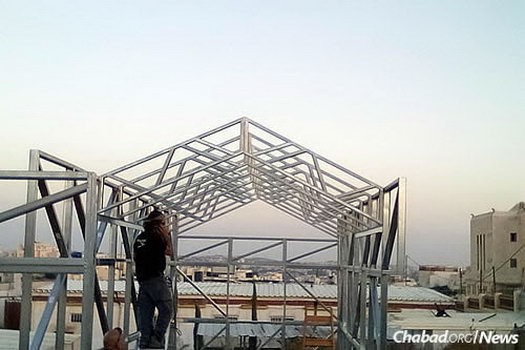
Innovative Israeli-Designed House Frames Donated for Rural Nepal
Since the April 25 earthquake and the ensuing tremors that devastated of Nepal, some villagers have rebuilt their feeble mud homes, only to see them washed away by mudslides that plague the South Asian nation.
But help may be on the way in the form of ready-made homes now being made in Israel.
“In the weeks and months following the quake, we gave out approximately 1,000 [sturdy, waterproof] tents to families in need,” says Rabbi Chezky Lifshitz, who co-directs Chabad of Nepal in Kathmandu with his wife, Chani, “and we’ve now moved on to helping people rebuild their homes in places determined to be safe. But for people living on steep inclines, we realize that to build their mud homes would be futile since there is no way they can remain steady.”
Heavy rains fall in the country from June through August, and typically during September as well—a time when tourists tend to refrain from visiting. The excess water causes landslides that can take everything with them, including homes.
To alleviate the situation, the rabbi partnered with an Israeli firm, Best Trail, to design metal frames for houses that can then be finished using local building materials, including the plentiful mud that has been used by impoverished villagers for generations. The structures are specially designed to withstand earthquakes, monsoons and other inclement weather.
Modeled after typical Nepali homes, each house measures 32 square meters (350 square feet). Since many of the homes are expected to be positioned in remote areas inaccessible by roads, each kit comes disassembled in pieces no larger than 1.5 meters, which can be carried by hand and assembled on the spot.
The frames—which cost $1,500 each to produce, but will be distributed free of charge—are designed to accommodate running water and electricity, something that many Nepali homes do not have.
The rabbi says the first cohort of 30 homes, which will serve as a feasibility test for subsequent ones, has been produced in Israel.
“If those go well and we have the funds,” he says, “we hope to be able to make even more and more of these homes, giving people a safe, permanent place to live—even better than before.”
To help with the still-ongoing earthquake relief effort, visit the special relief fund page: www.Chabad.org/Nepal.


















Ufaratzta
These are Ovdei Avodah Zara mamish. The Torah says ולא תחנם. Look up the Rambam הלכות ע״ז.
״אסור לרחם עליהם״
To #1
The Gemara also says: שוטה, אין מרחמין עליו. So what are we to do with you?